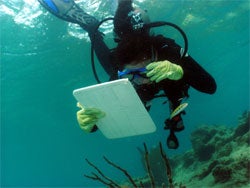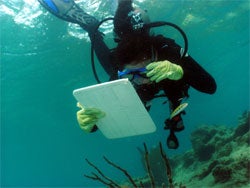 KINGSTON, R.I. – August 14, 2012 — Sarah Merolla took a scuba diving class at the University of Rhode Island last spring, figuring that it might come in handy once she becomes a marine biologist. She put her newfound skills to use sooner than she expected as she spent three weeks this summer diving twice a day on a restored coral reef in the British Virgin Islands to monitor whether fish populations have returned to the reef.
KINGSTON, R.I. – August 14, 2012 — Sarah Merolla took a scuba diving class at the University of Rhode Island last spring, figuring that it might come in handy once she becomes a marine biologist. She put her newfound skills to use sooner than she expected as she spent three weeks this summer diving twice a day on a restored coral reef in the British Virgin Islands to monitor whether fish populations have returned to the reef.
The reefs on Guana Island died decades ago from a combination of warming waters, damage from boats, and natural causes.
“When the reef dies, the fish disappear because they have no habitat,” said Merolla, a native of Hillsborough, N.J., who will be a URI junior in September. “Previous students have been restoring the reef with elkhorn coral, which is growing well, so now there is a lot of available habitat. My job was to monitor the reef to see if the fish have returned.”
Under the guidance of URI Professor Graham Forrester, Merolla focused her search on juvenile three-spot damselfish, a small reef fish that is known to prefer structurally complex habitats, such as elkhorn corals, during their larval stage. If juvenile damselfish are observed at the reef, it suggests that the larval fish have re-colonized the reef.
Every morning Merolla would dive for an hour to the reef 10 feet below the surface and take notes on the number of fish she observed and the habitat they were using. She repeated the process every afternoon.
“Before the elkhorn was restored, there were no juvenile damselfish, and now there are,” she said. “By restoring the reef we’re restoring the fish population there as well.”
Merolla, the treasurer of the URI Marine Science Society and a member of the URI Wildlife Society, was thrilled with the experience her research project provided.
“I’m a really new diver, so being in the water every day gave me great experience in how to do research and take notes under water,” she said. “I really progressed with my diving ability and learning how to work under those conditions. And just being under water every day and seeing the animals was amazing.”
Merolla’s research was funded by a Rhode Island Summer Undergraduate Research Fellowship through the EPSCoR (Experimental Program to Stimulate Competitive Research) program of the National Science Foundation. She presented the results of her research at a conference at URI on July 27.
The URI student won the Hollings Scholarship from the National Oceanic and Atmospheric Administration in April, the nation’s most prestigious scholarship for students studying the marine sciences. She will receive $16,000 toward her tuition for her junior and senior years at URI, plus a paid summer internship next year at any NOAA research lab in the country. She hopes to intern at the NOAA Office of Oceanic and Atmospheric Research.
“I’m a little fuzzy about exactly what my future plans are,” concluded Merolla, who has also conducted research at URI on sharks. “But I know that whatever I do, as long as I’m working with marine animals, I’ll be happy.”
Photo submitted by Sarah Merolla.

